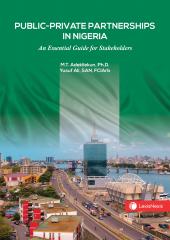The Supreme Court and Jurisprudence of the right to a Fair Hearing in Nigeria
The right to a fair hearing stands as a cornerstone of any just legal system.

One Year Subscription Only Terms
Subscribers receive the product(s) listed on the Order Form and any Updates made available during the annual subscription period. Shipping and handling fees are not included in the annual price.
Subscribers are advised of the number of Updates that were made to the particular publication the prior year. The number of Updates may vary due to developments in the law and other publishing issues, but subscribers may use this as a rough estimate of future shipments. Subscribers may call Customer Support at 800-833-9844 for additional information.
Subscribers may cancel this subscription by: calling Customer Support at 800-833-9844; emailing customer.support@lexisnexis.com; or returning the invoice marked 'CANCEL'.
If subscribers cancel within 30 days after the product is ordered or received and return the product at their expense, then they will receive a full credit of the price for the annual subscription.
If subscribers cancel between 31 and 60 days after the invoice date and return the product at their expense, then they will receive a 5/6th credit of the price for the annual subscription. No credit will be given for cancellations more than 60 days after the invoice date. To receive any credit, subscriber must return all product(s) shipped during the year at their expense within the applicable cancellation period listed above.
Product description
The right to a fair hearing stands as a cornerstone of any just legal system.
This pivotal new work provides unparalleled insights into the Nigerian Supreme Court's jurisprudence on this fundamental right. Beginning with an in-depth exploration of key conceptual issues, the book examines the Court's historic role in constitutional interpretation and the development of judicial precedent in Nigeria. Extensive analysis is provided on the Court's approach to fair hearings under the 1979 and 1999 Constitutions. Landmark cases regarding criminal proceedings, professional discipline, chieftaincy disputes and more are reviewed. The implications of the Supreme Court's fair hearing jurisprudence are discussed, along with an agenda for reform. Comparative analysis with international human rights instruments reveals how Nigeria's protections measure up to global standards. This incisive work is essential reading for judges, lawyers, academics and anyone interested in the Supreme Court's vital role in upholding the right to a fair hearing. It provides unmatched insights to help strengthen this crucial pillar of Nigeria's democracy.
Table of contents
CHAPTER_1 - Preliminary Issues and Conceptual Clarifications
CHAPTER_2 - The Supreme Court of Nigeria
CHAPTER_3 - Evolution and Development of the Right to a Fair Hearing
CHAPTER_4 - Supreme Court's Attitude to Fair Hearings under the 1979 Constitution
CHAPTER_5 - Supreme Court Decisions on Fair Hearings under the 1999 Constitution
CHAPTER_6 - Implication of the Supreme Court's Jurisprudence on Fair Hearings and Agenda for Reforms
CHAPTER_7 - International Human Rights Instruments on Fair Trials

